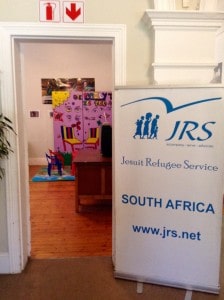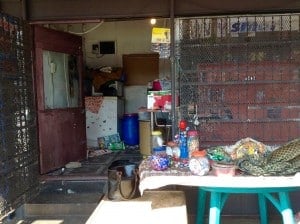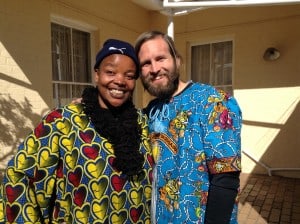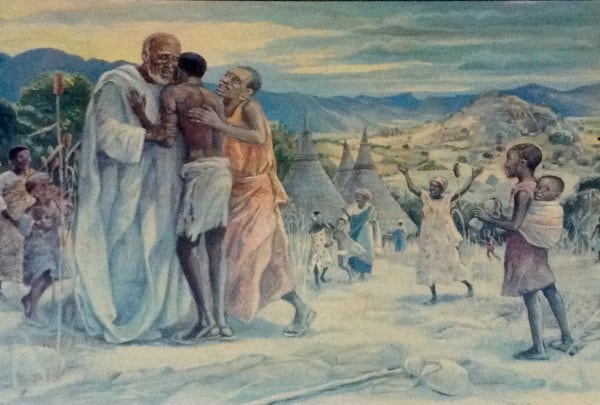I met Mapenzi in a puddle of tears. She rents a small shop on a strip of single room stores on a busy street near downtown Johannesburg. During the day, she sets up a table outside the shop and sells candy for pennies each. Her eldest daughter sits in a plastic chair and offers to braid hair for a small fee.
Mapenzi is one of the thousands of refugees in South Africa. Her story is tragic and heartbreaking. It’s hard to hear, but it’s important that we hear it. When Pope Francis calls us to serve the “most vulnerable,” he is talking about Mapenzi.
* * *
Fact: There have never been more refugees in the world than today. In 2015, the United Nations officially recorded the largest number of refugees in human history. As we know from news stories coming from Syria, the global spike in refugees is particularly tied to conflicts in the Middle East. But the number of refugees has grown in many other parts of the world as well.
I spent several months of 2015 working with refugees in South Africa, several thousand miles south of the Middle East and Europe. Despite its distance from conflict zones, there are over 300,000 refugees and asylum seekers in South Africa alone. That’s enough to fill a basketball arena fifteen times over. The refugees come to South Africa from a variety of countries, cultures, and contexts. Many people flood the border from unstable neighboring countries, especially Zimbabwe. Others flee the violence of the Democratic Republic of the Congo (DRC) or threats of terrorism in Somalia. Still others seek to escape ethnic and religious persecution from other African countries. As with most refugees across the world, many of the refugees in South Africa are Muslim.
The global refugee crisis has moved many people to respond. Jesuit Refugee Services (JRS) is an international organization founded by the Society of Jesus in 1980 at the request of then-Superior General Fr. Pedro Arrupe. In South Africa, JRS works with the diverse multitude of urban refugees, who settle in major cities. The main country office for JRS is in Johannesburg, a city of five million people (roughly the size of Philadelphia). The people of Johannesburg face the strain of cultural and ethnic divisions.
JRS offers emergency assistance, livelihood training and support, and advocacy for the thousands of refugees who come to their door looking for help. I spent my time working with home-based care nurses who address health concerns, provide referrals for medical treatment, and make visits to those who are sick.
* * *

JRS Office in Johannesburg
When a refugee arrives at JRS for the first time, an initial assessment is conducted. What is his immigration status in the country? Where has she come from, and how long has the individual been in the country? What are the person’s needs? It’s an introduction to the story of each refugee. While going through old files, I came across a “vulnerability index” that used to be included in the initial assessment. It was a simple questionnaire (Y/N) used to score and rank the vulnerability of a refugee. “Yes” answers are tallied on the side and a total amount is given. Is the refugee…
-Female?
-Single?
-Sole Caretaker for Dependents?
-Unemployed?
-Health Issues? (e.g. HIV+)
-Financial Issues? (e.g. school fee debts, paying rent)
-Victim of Sexual and Gender-Based Violence?
A “yes” to any one of these questions suggests a higher level of vulnerability for a refugee in a foreign country. The index was an attempt to quantify vulnerability to help in prioritizing limited resources.
My time at JRS was dedicated to working with those who would have checked “Yes” in the last entry on the index: victims of sexual and gender-based violence (SGBV). On the index, it might as well have been renamed “All of the Above,” because nearly all those whom I encountered that were victims of SGBV answered “Yes” to every other question on the vulnerability index.
Meet the most vulnerable. Here are two of their stories.
* * *
Meet Aafreen. Her husband was killed by the militant terrorist group al-Shabaab in her home country of Somalia. Fearing for her life and the life of her children, Aafreen took her five boys and her disabled mother and fled the country.
After journeying by foot and bus through Kenya and Tanzania, she reached a port city on the east coast of Africa. Desperate to reach a stable country to settle, she paid a smuggler to pack herself and her family into a shipping container bound for South Africa. They were enticed by the country with the most robust economy on the African continent.
Aafreen’s two-bedroom apartment is shared by two families (not two people — two families). She has no job, so she tries to make money by cooking small snacks and selling them on the street. She suffered a setback recently when her oven and stove broke. She can’t afford to fix it. She owes school fees for her children, but how is she supposed to pay those?
Our conversation vacillated between friendly banter punctuated by her booming laugh and mile-wide smile, and heavy moments when words were harder to find and tears filled our eyes. She had a story to share.
Aafreen caught a bus on her way back from downtown Johannesburg one day. She wasn’t the only passenger on board, but it quickly set in that something wasn’t right. The other passengers on the bus, all men, seemed to know the driver. They were talking quietly and firmly with one another. Something was off. Within a few blocks, the taxi took an abrupt turn down a secluded street. Aafreen was restrained by the male passengers. They held her down as the driver sexually assaulted her.
Aafreen had come to South Africa to escape the threat of violence from terrorists in her home country. Now she is a single mother of five without work, traumatized by a taxi ride home. She has suffered from sexual violence.
Check “All of the Above.”
* * *
Meet Mapenzi, mentioned at the start. Her village in the DRC was burned down in the midst of the civil war that has plagued the country for years. Fleeing the burning buildings and the ensuing firefight, Mapenzi was separated from her husband and two of her sons. To this day, she doesn’t know if they are dead or alive. It’s been years and she hasn’t heard a word from them.
Mapenzi escaped the fire with her two daughters and youngest son. They immediately fled the country and made their way south before eventually settling in South Africa.
I met Mapenzi outside her shop on a crisp, sunny day as she was selling her candies. Within just a few minutes of conversation, tears began streaming down her face. It was so clear that she was weighted down by her past and the daily struggle to survive and support her family.

Mapenzi’s Shop
She pointed to the shop behind us: a space that is only about 10 feet wide and 5 feet deep. When the sun goes down, she explained how they pack things back into the small shop, lock the door, and lie down on the floor. Mapenzi sleeps there with her three teenage children and two infant grandchildren: they basically sleep on top of one another. A gas-powered camping stove heats the canned food they eat once a day.
Mapenzi got the small shop from the kindness of a Nigerian storekeeper who has since fled South Africa. Her new landlord is demanding rent payments of over $100/month. Mapenzi can’t come close to paying that amount (she makes a few dollars a week if she’s lucky). She hasn’t paid school fees for her children in years; her eldest recently completed high school, but her diploma was withheld due to unpaid fees. Unfortunately, employers and colleges require diplomas. Mapenzi can’t afford a piece of paper to buy her daughter opportunity.
Both of Mapenzi’s daughters have been sexually assaulted. Her eldest daughter, Priscilla, was raped in South Africa and gave birth to a baby. She’s pregnant with her second child, but her boyfriend was recently deported to Nigeria.
Mapenzi’s younger daughter, Chance, was kidnapped when she was just 13 years old. She was missing for three months. The kidnapper was a local man- a neighbor- who kept her locked in a back room of his property. She was raped repeatedly over those three months before finally escaping. The local police took a statement, but collected no evidence and made no arrests. Chance gave birth to a boy a few months later. The trauma is overwhelming: she barely speaks.
Mapenzi and her family: the most vulnerable.
Check “All of the Above.”
* * *

The author with JRS home-based care nurse Marcelline Sangara
Aafreen and Mapenzi are not alone. They were among the dozens of women I met this past summer who had suffered acute trauma from sexual assault. And they number among the thousands (more likely, millions) of refugee women who have suffered from sexual assault.
Sexual assault occurs in the home countries of refugees that are ravaged by civil war. It occurs in transit as refugees make their way across borders seeking a safer home. It occurs where refugees settle, with dreams of a safer life shattered by sexual violence.
Each of them has a story. A story is hard to capture by a simple index. Perhaps that’s why JRS tossed aside the “vulnerability index.” How can you capture life’s challenges and hardships in a short list of yes or no questions? And for those of us half a world away, how can we respond in the way that Pope Francis challenges us to? It begins with listening. The stories of Aafreen and Mapenzi are hard to hear — and that’s precisely why they’re important. Hearing their stories can move us to grow in compassion. The injustices of the world need to be exposed for change to happen.
We know too that the refugee crisis reaches us here in the United States. Immigrants journey across our southern border, and our politicians debate the acceptance of Syrian refugees. We are bombarded with different characterizations — usually unfavorable — of immigrants and refugees. The stories of Aafreen and Mapenzi put names and histories to the countless faces we see on TV.
Aafreen and Mapenzi shed light on why refugees migrate in the first place. These are not stories of criminals or terrorists setting out to spread violence to new countries. These are the stories of people fleeing violence and persecution, in hope of a better life. This is the story of countless immigrants to the United States over the centuries — including most all of our forebears.
There are countless Aafreens and Mapenzis around the world. They are at our door, knocking. Will we ignore their pleas, or will we have the courage to meet the most vulnerable?
–//–
All photos are courtesy of the author.


